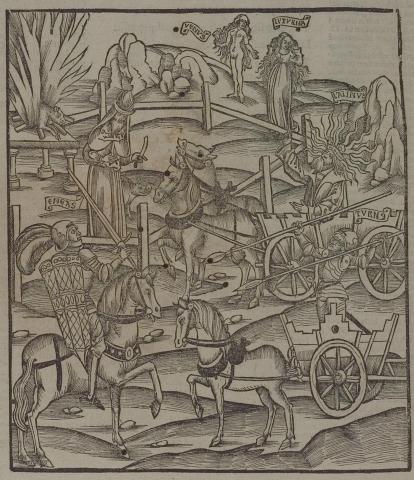CORE VOCABULARY
Aenēās, ae, m.: 1. A Trojan chief, son of Venus and Anchises, and hero of the Aeneid, 1.92. 2. Aenēās Silvius, one of the Alban kings, 6.769.
stringō, strīnxī, strīctus, 3, a.: to draw tight, bind; of a sword, draw out, draw, 2.334; graze, touch lightly, go near, 5.163; trim up, cut, 1.552; (fig.), touch the mind, 9.294.
ēnsis, is, m.: a sword, 2.393, et al.; knife, 2.155.
possum, potuī, posse, irreg. n.: to be able; can, 1.242, et al.; to avail, have influence, power, 4.382. (potis and sum)
perferō, tulī, lātus, ferre, irreg. a.: to carry or bear through; carry, restore, return, 11.717; report, 5.665; convey completely, carry home, 10.786; reach the mark, 12.907; undergo, endure, suffer, 3.323; (w. reflex. pron.), betake one's self, go, 1.389; p., perlātus, a, um, carried to the mark; striking, 11.803.
omnipotēns, entis: adj. (omnis and potēns), all-powerful, almighty, 1.60; supreme, sovereign, 10.1; subst., The Almighty, 4.220.
Sāturnius, a, um: adj. (Sāturnus), belonging to Saturn; Saturnian; sprung from Saturn; Saturnian, 4.372; subst., Sāturnius, iī, m., the son of Saturn, 5.799; Sāturnia, ae, f., 1. Daughter of Saturn, Juno, 1.23; 2. The city of Saturnia, built by Saturn on the Capitoline hill, 8.358.
dīva, ae, f.: a goddess, 1.632, et al.
inclutus, a, um: (adj.), famous, glorious, renowned, 2.82. (rel. to clueō, to be heard of; κλύω, hear; κλυτός, renowned)
Mārs (archaic form, Māvors), Mārtis: Mars, son of Jupiter and Juno; the patron of war and tutelar god of the Romans, 1.274, et al.; (meton.), martial spirit, courage, warlike fury, 6.165; battle, conflict, 2.335, et al.
torqueō, torsī, tortus, 2, a.: to wind, turn, twist, 4.575; roll along, 6.551; whirl, hurl, 3.208; shoot, 5.497; cast, dash, 1.108; direct, 4.220; turn away, 6.547; turn, cause to revolve, 4.269; control, 12.180; p., tortus, a, um, whirled, whirling, impetuous, 7.567.
fluvius, iī, m.: a stream; river, 1.607; water, fountains, abundant water; secundō fluviō, by the favoring stream, with or down the stream, 7.494. (fluō)
religiō, ōnis, f.: reverence for divine things; piety, devotion, 2.715; sanctity, 8.349; worship, sacred ceremonial, observance, 3.409; sacred thing, symbol, token, 2.151; object of worship; divinity, 12.182; augury, 3.363.
caerulus, a, um: (adj.), dark blue, 2.381; sea-colored, azure, 5.819; dark; black, 3.64; subst., caerula, ōrum, n., the dark blue waters; the sea, 3.208.
Ausonius, a, um: adj. (Auson), Ausonian; Italian, 4.349; subst., Ausoniī, ōrum, m., the Ausonians; Italians, 11.253.
fors, fortis, f.: chance, hazard, luck, hap, fortune, 1.377; nom., fors, as adv. (for fors sit), haply, perchance, 2.139, et al.; abl., forte, by chance, perchance, haply, 1.375, et al. (rel. to ferō)
Turnus, ī, m.: the chief of the Rutulians, 7.56, et al.
Euander (-drus, 8.100; Ēvander, -drus), drī, m.: Evander, an Arcadian prince, son of Carmentis, and king of Pallanteum on the Tiber, 8.52.
discēdō, cessī, cessus, 3, n.: to go apart or away, retire, withdraw, depart, 2.644; open, 9.20.
Iūlus, ī, m.: Iulus or Ascanius, son of Aeneas, 1.267, et freq.
nec or neque: (adv. and conj.), and not; neither, nor, 1.643, et al.; in prohibition, 3.394, et al.; neque (nec) — neque (nec), neither — nor, 5.21, et al.; nec — et, or -que, may be rendered neither — nor, 12.801; 2.534; nec nōn, and also, nor less, 6.183; nec nōn et, and also, 1.707.
rebellis, e: adj. (re- and bellum), warring or making war again, 12.185; rebellious, insurgent, 6.858.
Aeneadēs, ae, m.: a son of Aeneas; pl., Aeneadae, ārum, followers of Aeneas, the Trojans, 1.565; Aeneadae, 3.18.
lacessō, cessīvī, cessītus, 3, intens. a.: to provoke, rouse, irritate, incite, 5.429; call forth, summon, rouse, 10.10; challenge, attack, assail, 11.585; strike, smite, 7.527; slap with the hand, caress, cheer, 12.85.
sīn: (conj.), but if, if on the contrary, 1.555, et al.
adnuō, nuī (ūtus, rare), 3, a. and n.: to nod to; with dat., acc. and dat., and infin.; ascent, consent, 4.128; promise, 1.250; direct, permit, 11.20.
potius: (adv.), preferably; rather, 3.654. (potis)
fīrmō, āvī, ātus, 3, a.: to make firm or strong; make steady, assure, 3.659; to establish, mature; confirm, 2.691; ratify, 12.212; encourage, 3.611, secure, guard, 11.466. (fīrmus)
Teucrī, ōrum, m.: the Trojans, descendants of Teucer, 1.38, et al.; adj., Teucrian, Trojan, 9.779, et al. (Teucer)
Italī, ōrum, m.: the Italians, 1.109. (Ītalia)
iubeō, iussī (fut. perf. iussō for iusserō, 11.467), iussus, 2, a.: to order, request, usually w. inf., freq.; bid, 2.3; ask, invite, 1.708; will, wish, desire, 3.261; direct, enjoin, admonish, 3.697; persuade, advise, 2.37; to clear by command, 10.444; w. subj., 10.53.
pār, paris: (adj.), equal, 1.705; like, 2.794; equal, well-poised, steady, 4.252; side by side, 5.580; well-matched, 5.114.
ambō, ae, ō: (adj.), both, 1.458.
invictus, a, um: (adj.), unconquered; invincible, 6.365.
foedus, eris, n.: a treaty, league, alliance, freq., truce, 5.496; side or party, 12.658; covenant, contract, 4.339; laws of hospitality, hospitality, 10.91; pledge, love, 4.520; law, term, condition, rule, 1.62. (rel. to fīdō, trust)
sacrum, ī, n.: a holy thing; pl., sacra, ōrum, n., sacred symbols, rites, 12.13; sacred rites, ceremonies, sacrifices, 2.132; sacred things, utensils, symbols, 2.293; mysteries, 3.112.
socer, erī, m.: a father-in-law, 6.830, et al.; pl., socerī, ōrum, parents-in-law, parents, 2.457.
Latīnus, ī, m.: Latinus, a king of Latium, whose capital was Laurentum, and whose daughter, Lavinia, became the wife of Aeneas, 6.891, et al. (Latium)
sollemnis, e: adj. (sollus, whole, and annus), coming at the completion of a year; annual; stated; ceremonial; religious, solemn, 5.53; festive, 2.202; customary, 12.193; subst., sollemne, is, n., pl., sollemnia, ium, solemnities, sacrificial rites, offerings, 5.605.
Lāvīnia, ae, f.: a Latin princess, daughter of King Latinus, 6.764, et al.

